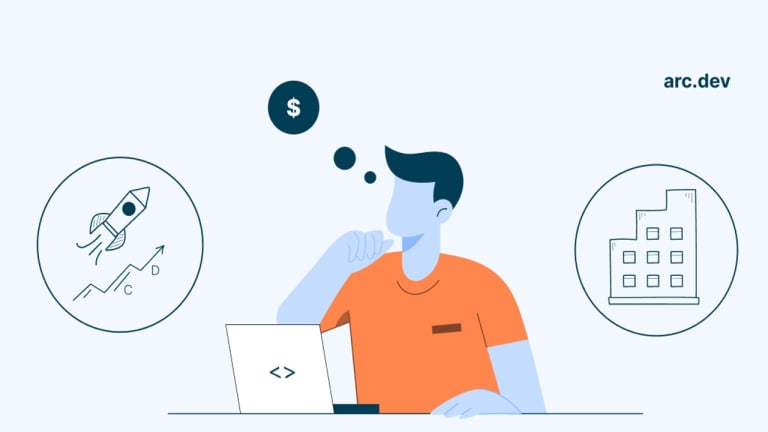
Developers getting more money in late-stage startups than in public companies: Report
Compensation & BenefitsBenefits & Rewards#GreatPowerShift
For developers, startups seem to be a better bet than public companies - pay-wise.
Remote developers in the US earn an 11.5% higher median salary ($145,000 vs $130,000) at late-stage startups (series C and D) than at public companies like Apple, Disney and Microsoft among others, reveals the findings from a survey by Arc, a US-based remote job search platform for developers.
Globally, the difference is 9%, says the the Arc salary survey with 2,839 respondents.
The largest portion of survey respondents (45%) work in the software and IT services industry. The data is global, with respondents based in the US, Canada, Europe, Asia, Africa, Latin America, and Australia.
The trend of late-stage startups paying higher developer salaries than public companies is observed nationally in the US, Spain, and Mexico.
Developers in Spain earn 14.3% more — $40,000 at late-stage and $34,990 at public companies and in Mexico Series C-D pays an annual median salary of $37,350, a massive 81.9% more than public companies ($20,529).
However, public companies in Colombia, Argentina, and India pay more than late-stage startups.
Seniority level pay differential
Globally, junior and mid-level developers with 0-5 years of experience earn 17.4% higher at late-stage startups than at public companies. Companies are willing to pay top wages to young, agile developers with new tech skills.
Senior developers with 6 and more years of experience earn 4.2% higher at late-stage vs public companies.
“It's no secret that salary is a major factor in choosing a job. The findings will help developers be more strategic about where they apply when job hunting. Last year saw an all-time high in global venture funding. Startups flush with funds are now vying to attract the best and brightest from secure and more established public companies,” says Christine Orchard, head of marketing at Arc.dev.
Salary at growth-stage vs early-stage startups
Not all startups are equal and salaries vary considerably depending on the stage, as per the report.
The report also looked at the difference in developer pay between growth stage (Series A and B) startups and early-stage (pre-seed or seed-funded) startups. Developers earn a whopping 30.5% higher median salary at Series A and B startups than at pre-seed or seed-funded startups globally, says the report.
Percentage increase in earnings in Series A & B vs. early-stage startups across countries:
- US: 8.7% higher at Series A and B ($125,000) vs early-stage ($115,000).
- Spain: 7.3 % higher at Series A and B ($34,000) vs early-stage ($31,680).
- Mexico: 18.8 % higher at Series A and B ($19,000) vs early-stage startups ($16,000).
- Colombia: 66.7% higher at Series A and B ($15,000) vs early-stage startups ($9,000).
- India: 8.8% higher at Series A and B ($40,000) vs early-stage startups ($36,750).
- However, in Argentina, growth-stage and early-stage startups pay the same annual median salary of $12,000.
Globally, the salary difference is more for junior developers than for senior developers: junior developers earn 51.3% more at Series A and B vs pre-seed and seed while senior developers get paid 6.7% higher at Series A and B vs pre-seed and seed.
“Many developers wonder if startups pay more than big companies. But not all startups are equal and salaries vary considerably depending on the stage. For example, well-funded late-stage startups may be able to offer high salaries as they have established product-market fit and stronger revenue streams to prove it.
"Whereas early-stage startups with less funding offer lower salaries out of necessity but can offer growth and learning opportunities. Developers should consider their own career goals and the overall offer including job security, brand name, equity, workload, and career progression,” adds Orchard.














